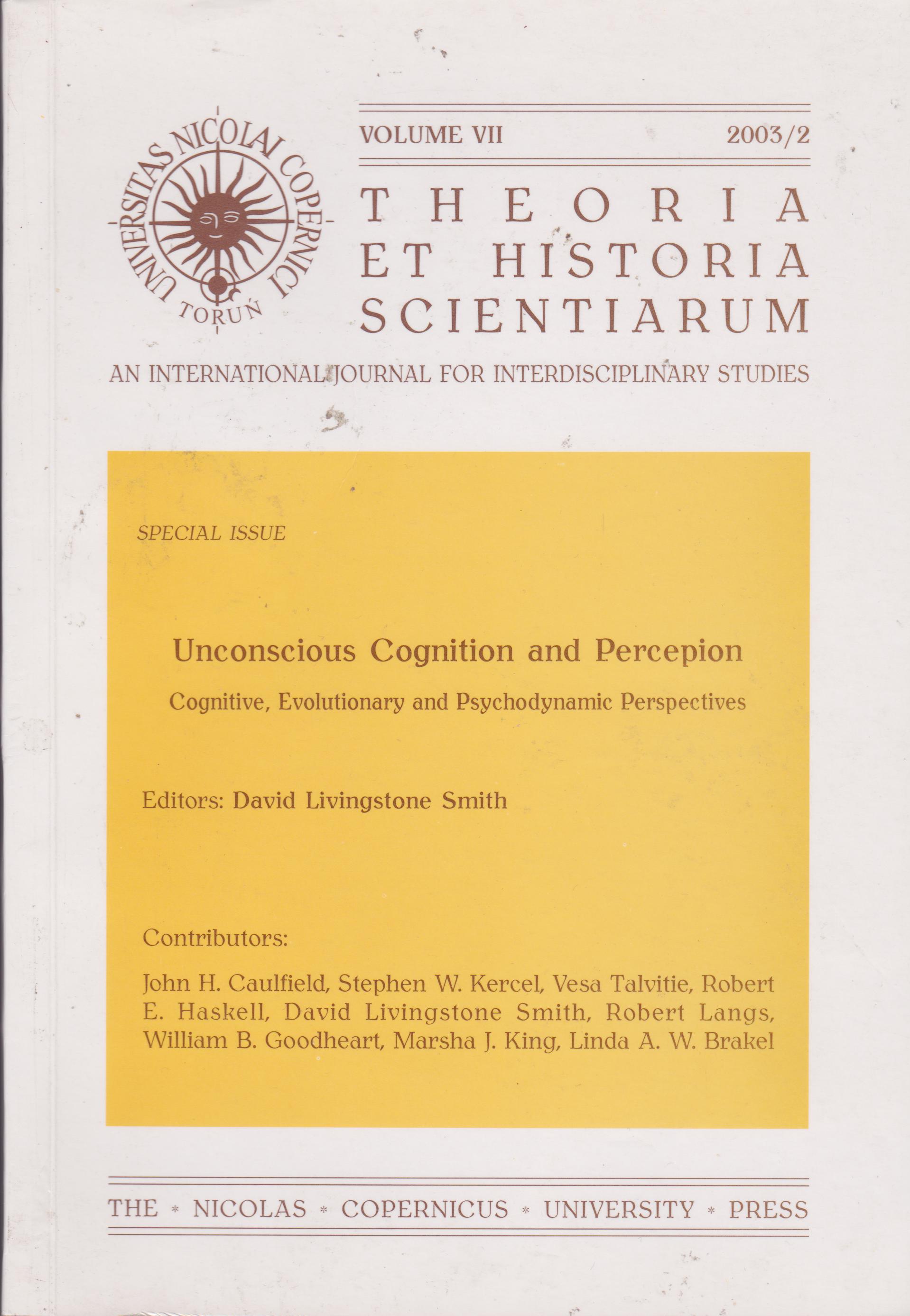Repressed Contents Reconsidered:Repressed Contents and Dennett’s Intentional Stance Approach
DOI:
https://doi.org/10.12775/ths.2003.017Keywords
repressed contents, consciousness, physical stance, repression phenomenon, instrumentalist viewAbstract
The conventional view presented in terms of repressed contents brought to consciousness (a ‘realistic view’ of repressed contents) is seen as untenable because the existence of repressed contents cannot be pinpointed. An instrumentalist view of the nature of repressed contents is sketched, and Dennett’s intentional stance approach is applied to the issue of repressed contents. As opposed to realistic view, it is suggested that becoming conscious of repressed contents should be seen as forming new contents of consciousness. However, it is seen as plausible to project unconscious contents into the mind in an instrumentalist manner. An instrumentalist view is suggested to avoid ontological problems concerning repressed contents.References
Bereś, D. & Joseph, E. D. (1970). The concept of mental representation in psychoanalysis. International Journal of Psycho-Analysis 51: 1-9.
Brenner, C. (1980) Metapsychology and psychoanalytic theory. Psychoanalytic Quarterly, XLIX, 189-214.
Brook, A. (1998) Neuroscience versus psychology in Freud. Ann. N.Y Acad. Sci. Vol. 843: 66-79.
Brooks, P. (1994) Psychoanalysis and Storytelling. Oxford: Blackwell.
Churchland, P. (1981) Eliminative materialism and the propositional attitudes. The Journal of Philosophy, LXXVIII, 2. Reprinted in R. Cummins & D. R.
Cummins (eds.) (2000) Minds, Brains, and Computers. The Foundations of Cognitive Science. An Anthology. Oxford: Blackwell Publishers: 500-512.
Dennett, D. (1969) Content and Consciousness. London: Routledge.
Dennett, D. (1978) Brainstorms: Philosophical Essays on Mind andPsychology. London: Penquin Books.
Dennett, D. (1987) The Intentional Stance. Cambridge, MA: MIT Press.
Dennett, D. (1998) Brainchildren: Essays on Designing Minds. London: Penguin Books.
Dennett, D. (1991) Consciousness Explained. London: Penquin Books.
Dennett, D. & Humphrey, N. (1998) Speaking for Our Selves. In The Intentional Stance. Cambridge, MA: MIT Press: 31-55.
Derrida, J. (1967) Writing and difference. (L’Ecriture et la difference). Tr. Alan Bass. Chicago: University of Chicago Press.
Fodor, J. (1985) Fodor’s guide to mental representation: The Intelligent Auntie’s Vade- Mecum. Mind. 94: 76-100.
Fodor, J. & Lepore, E. (1993) Is Intentional ascription intrinsically normative? In B. Dahlbom (ed.) Dennett and his Critics. Demystifying Minds. Oxford: Blackwell Publishers: 70-82.
Freud, S. (1915) The Unconscious. Standard Edition 14: 166-204.
Griinbaum, A. (1984) The Foundations of Psychoanalysis: A Philosophical Critique. Berkeley: University of California Press.
Kim, J. (1998) Mind in a Physical World: An Essay on the Mind-Body Problem and Mental Causation. Cambridge, MA: The MIT Press.
McCulloch, G. (1990) Dennett’s little grains of salt. The Philosophical Quarterly, 40, 1-12.
Nesse, R. M. & Lloyd, A. T. (1992) The evolution of psychodynamic mechanism. In J. H. Barków, L. Cosmides & J. Tooby (eds.) The Adapted Mind.
Evolutionary Psychology and the Generation of Culture, 601-624. New York: Oxford University Press.
Olds, D. D. (1992). Consciousness: A brain-centered, informational approach. Psycho-analytic Inquiry, 12: 419-444.
Rey, G. (1994) Dennett’s unrealistic psychology. Philosophical Topics, 22, 259-289.
Schimek, J. G. (1975). A critical re-examination of Freud’s concept of unconscious mental representation. International Review of Psycho-Analysis, 2: 171-187.
Searle, J. (1992) The Rediscovery of the Mind. Cambridge'. Cambridge, MA: The MIT Press.
Searle, J. (1997) The Mystery of Consciousness. London: Granta Books.
Spence, D. (1982) Narrative Truth and Historical Truth: Meaning and Interpretation in Psychoanalysis. New York: W. W. Norton Company.
Smith, D. L. (1999) Freud’s Philosophy of the Unconscious. Studies in Cognitive Systems, Vol 23. Dordrecht: Kluwer Academic Publishers.
Stich, S. (1992) What is a theory of mental representation? Mind, 101: 243-261. Westbury, C. &
Dennett, D. C. (2000) Mining the past to construct the future: Memory and belief as forms of knowledge. In D.
L. Schacter & E. Scarry (eds.) Memory, Brain, and Belief, 11-32. Cambridge, MA: Harvard University Press.
Downloads
Published
How to Cite
Issue
Section
Stats
Number of views and downloads: 630
Number of citations: 0



